I played MadLibs, created by Leonard Stern and Roger Price. For the platform, I used an app. I wanted to know more about the game mechanics and other questions like the theme and the types of fun presented.
The theme varies depending on the story chosen for the game, but a theme consistent across all MadLib stories is that they are funny and in narrative form. The theme of my story was playing video games, and the theme of my friend’s story movies. For the mechanics, each player is prompted to give a series of words like nouns, adjectives, verbs, etc.
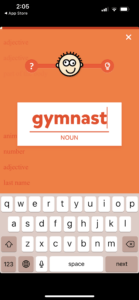
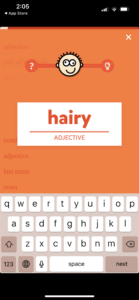
These will go in the corresponding blanks in a pre-written story. Once each player fills out their words, they are presented with the final story they created, and they can read it out loud to friends. The objective is to create a funny story. Although this game can be played by oneself, I played it alongside a friend, so we could read our created stories to each other.
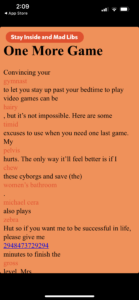
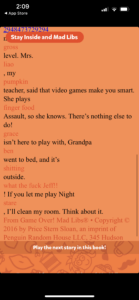
Many types of fun are promised, including fantasy, narrative, and sometimes fellowship (if played with multiple people). Graphic design decisions reinforce the general theme of creative, funny stories, since there are funny-looking cartoons accompanying the start page of the game.
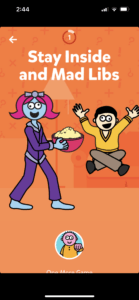
The graphic design decision of having a cartoon with a silly face respond to the answers the user chooses reinforces the fantasy kind of fun, reminding players that they are creating a fun make-believe story.

Vibrant cartoon and screen colors also reinforce this fantasy type of fun, reminding the user of being out of the ordinary/real world. The graphic design decision of displaying the finished story sequentially on one page reinforces narrative fun, reminding the user of reading a story.
To differentiate itself from others in its genre, MadLibs incorporates randomness, created by the users not knowing what the other words in eventual story will be, to build a funny story. Additionally, MadLibs is not competitive; when playing with others, users can collectively laugh at funny stories created instead of competing (so the game is not zero-sum). Scrabble, for example, is competitive and does not involve stories/narratives created through randomness.
MadLibs does not explicitly handle abuse, since it is not very applicable here. One concern for abuse may be when players are playing with others; some people may make fun of words chosen by other players, but if people are civil and do not make fun of others’ choices, abuse should not be a significant concern.
To make the game better, I would try to ensure that the pre-set stories are interesting, and that they can work with many hypothetical responses users may input for their answers. Otherwise, the final story may not be funny or make sense. Moreover, the layout of the final story could have been displayed in a more visually appealing way, so it reads even more like a story. There also could have been more visuals to accompany the story to make it feel more narrative-like.


